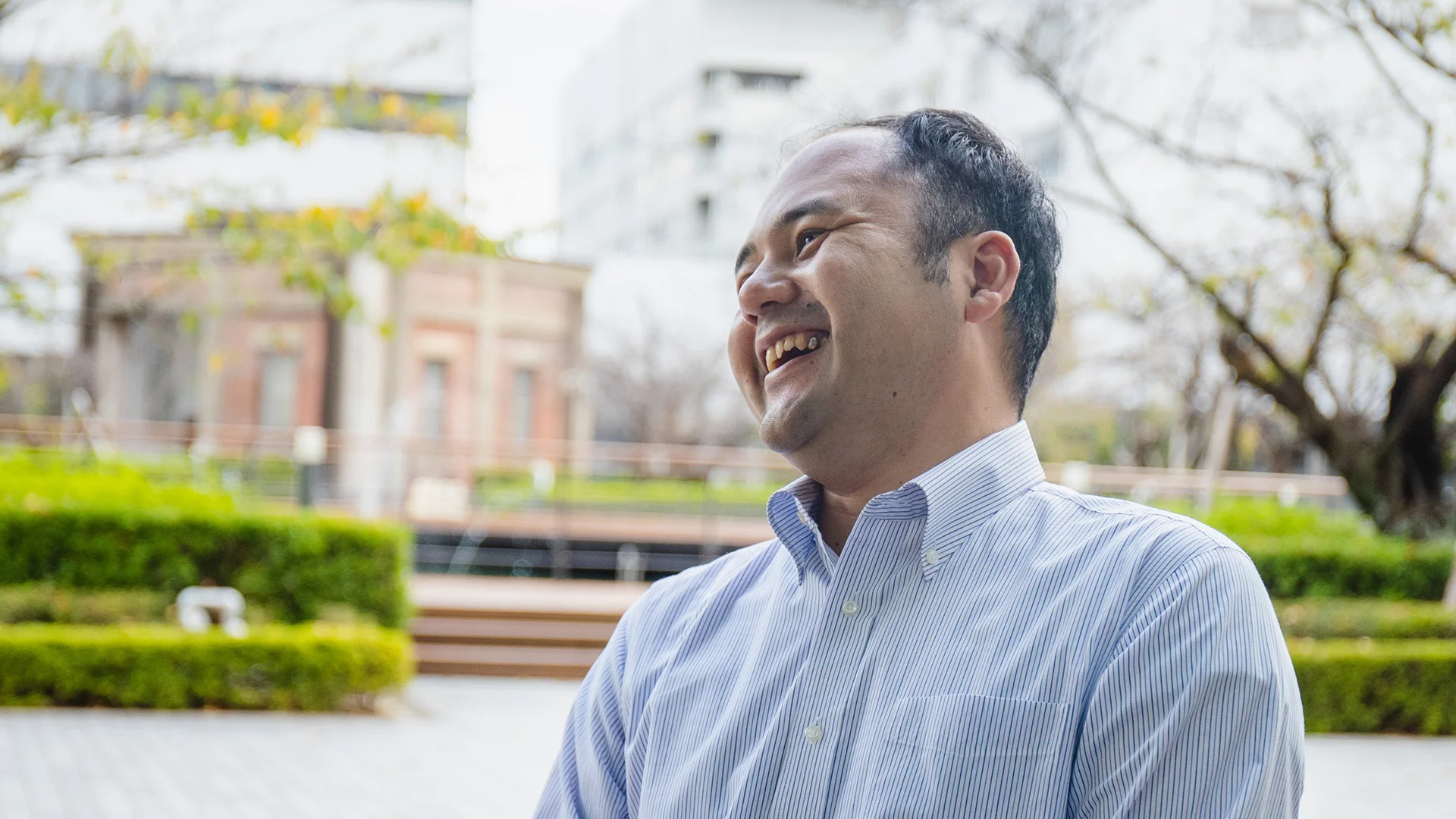

Nov 29, 2022
CAREER & LIFEEliminating traffic accident deaths through brain science research
Motivated by the vision of a fantastical future in which even kids can drive
By meeting outside of the workplace with ambitious, hard-working associates at DENSO—as well as those who seem like fascinating individuals—it’s possible to break down the barriers of formality and talk openly, listening to their heartfelt concerns along with their unfiltered dreams and goals.
In this “Stories of our Associates” interview series, we chat casually with a wide range of professionals at DENSO to learn what truly drives them in their work, as well as their ambitions and dreams.
For this interview, I talked with Koji Hamada of the R&D Center’s HMI R&I Dept.
Hamada is engaged in brain science research with the goal of reducing traffic accident deaths to zero. With the aim of establishing definitions for different levels of concentration seen in the driver’s brain, he believes it’s possible to determine whether the driver is fit to be driving the vehicle and provide appropriate support for safe driving.
In his characteristically gentle voice, Hamada explained his vision for the future which fills him with pure, childlike excitement. Behind this vision lies unlimited imaginative power.
While chatting, I came to understand how Hamada responds when faced with tough problems, and how he motivates himself to work on new endeavors. Let’s hear the true story behind Koji Hamada.
Contents of this article
Creating truly convenient products and services by turning to brain research
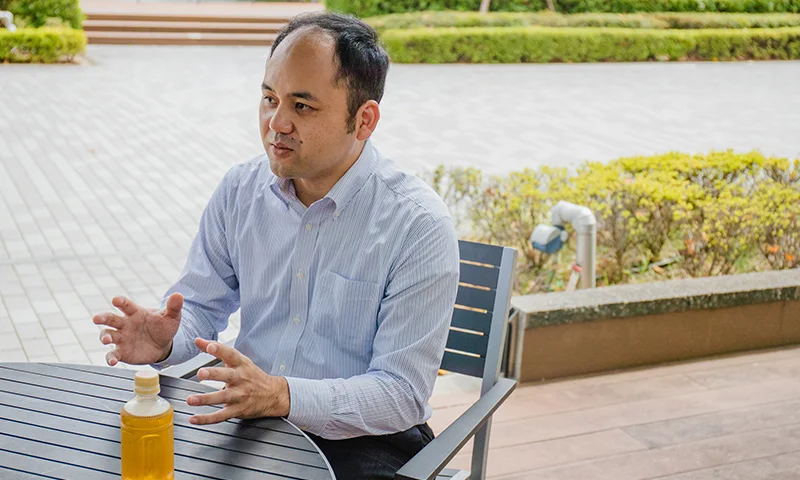
─── To start with, please tell me about the project you’re working on.
Hamada:I’m researching the human brain with the aim of helping the driver to drive more safely. No matter how careful people are when behind the wheel, they may be tired, become sleepy, or lose focus due to distractions.
─── I know what you mean. Once while driving, I accidentally ran into the wall of my house’s garage, even though I thought I was concentrating.
Hamada:Levels of concentration cannot be physically observed, so it’s surprisingly difficult to quantify your own concentration level in a tangible, objective form.
─── That’s so true.
Hamada:My motivation for starting this project was to find a way to define brain states in order to ensure that suitable levels of concentration are maintained while driving.
─── Fascinating!
Hamada:So, I worked with a university specialist to measure brain activity using MRI scans. My goal was to determine the brain’s state during various situations, such as when the driver is focused or when they are distracted, and then find ways to keep them in that focused state while operating the vehicle.
─── How did you go about defining different states of concentration?
Hamada:We had test subjects operate a driving simulator while in an MRI machine, looked at which parts of the brain were active when they were driving well and when they were driving poorly, and then defined those concentration states. Our future goal is to create an environment in which the driver is naturally able to better concentrate on driving.
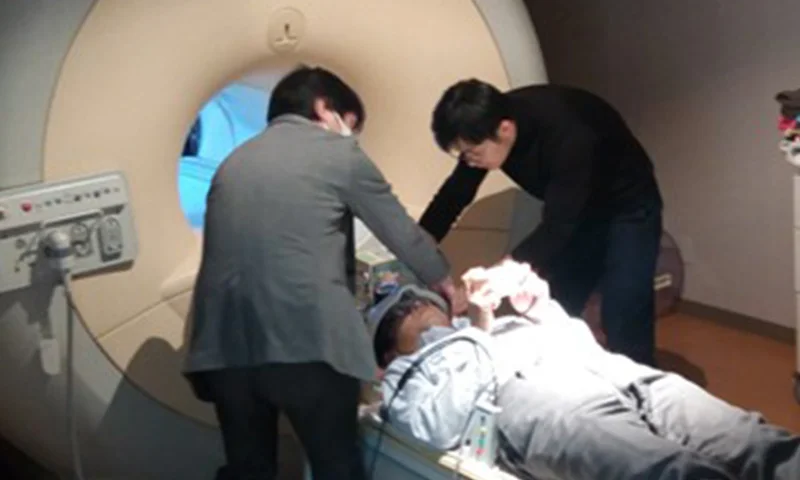
─── What a neat idea, safe driving based on the human brain! Have you always been interested in this field?
Hamada:No, actually. I studied virtual reality at university, and after joining DENSO I began working with human–machine interfaces (HMIs). My research focused more on operating in-vehicle devices than on driving itself.
─── So how did you end up in brain research?
Hamada:Well, it’s important to come up with good ideas, right? And the ones who ultimately use those ideas are people.
─── Sure.
Hamada:People think about things by putting themselves in the shoes of others, and by making predictions based on past experience. I felt that, unless I better understood how the brain works, I wouldn’t be able to come up with truly useful innovations for people.
─── I see.
Hamada:Put simply, my research focus shifted from machines to humans.
Imagining new worlds: fascinating possibilities as the driving force

─── I understand you’ve been involved in a diverse range of research. Are there any common factors among them?
Hamada:In all the fields of research I’ve worked in, the one common factor is my desire to realize, in real life, people’s original visions and aims. Whether working with VR or physical-device operations, I’ve always tried to find ways of actually implementing the things people envision, to make things work the way people originally imagined.
─── What motivates you?
Hamada:Whether at work or in my personal life, I love to dream up exciting new things in great detail. I often get lost in thinking about those potential worlds and exciting new futures. That’s what motivates me.
─── That’s truly inspiring!
Hamada:I really like sci-fi manga and movies, such as Ghost in the Shell with its imaginative technologies.
These types of media give visual form to the imaginations of writers, and in a similar fashion, I often fantasize about what it would be like if some new technology materialized before my eyes in real life, for all to see and experience. That sort of thing fascinates me.
─── I envy your youthful imagination! We could all learn a thing or two from you.
Hamada:With automobiles, which is my current area of research, I am motivated in a similar way. Although current automotive systems and designs are hardly flawed, there are times when I’m driving or talking about cars that I feel certain areas could be made more user-friendly.
Cars are an integral part of our daily lives including mine, so as long as I can keep coming up with new ideas, I plan to keep working in this field.
─── Do you ever tell other people about your new ideas?
Hamada:If it’s something I think everybody can relate to or readily understand, I’ll discuss it with other DENSO associates. However, I do have to exercise some restraint as there are times when I get worked up about an idea but other people don’t really respond, which is kind of embarrassing. [laughs]
─── Could you share one of your more interesting ideas with me? I’d love to hear more.
Hamada:Well, I could tell you about one idea, although most of my ideas have already been influenced by feedback and input from others.
─── That would be great!
Hamada:One thing I’ve imagined is a future in which kids are able to drive around in cars by themselves. I’m not talking about automated driving; what I mean is children using the steering wheel, stepping on the accelerator and brake, and actually driving the car.
─── Interesting.

Hamada:Any child would be thrilled at the opportunity to drive a car on their own, because driving looks so much fun to them. That’s why I think it would be great if there were a car for kids which was fun but would also safely deliver passengers to their destination, without breaking traffic rules or having to know the route.
─── Kids would love it. What an interesting idea!
Hamada:Whenever I start thinking about something like this, I get really caught up in the idea.
Working with others to accomplish things that are impossible on one’s own
─── Could you talk about your personal values and approaches when at work?
Hamada:I always try to interlink the things that I want to do with the goals of others around me, exchange ideas with others, and expand the possibilities for everyone.
On a personal level, I want to create new technologies that completely change our world, but that’s impossible to do alone. By finding things in common with the ideas of people around me, it’s possible to foster synergies.
─── I see.
Hamada:If you take sole control over another person’s goal or ambition as your own, then you’re cutting out other people from the process, which makes others feel left out. This is something I don’t want. In contrast, if you share an idea with someone else, then you can both move in that same direction together.
─── In other words, you focus on making sure everyone around you is involved?
Hamada:Yes. That’s not something I’m naturally good at, so I have to focus on it. [chuckles]
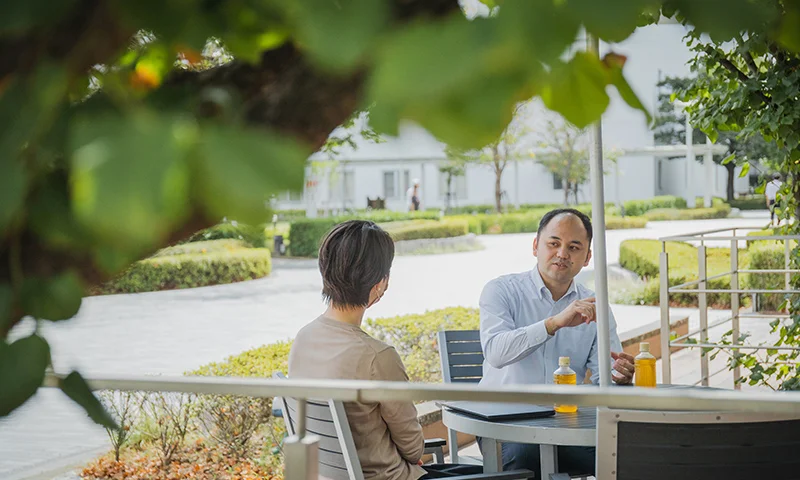
─── Can you give me a specific example from a past project?
Hamada:To make sure I don’t become too wrapped up in my own ideas, I always try to incorporate the ideas of others around me and involve them in my work.
For example, my R&D center often collaborates with other business units. The R&D center is passionate about R&D to create new technologies, whereas business units are concerned with delivery deadlines and profit targets while realizing the company’s vision. Because our roles differ, our outlooks and opinions don’t always match.
Rather than trying to impose the approach of the R&D center on the business unit, I’ve learned that the best solution is to make sure we have the same goals and sense of direction from the project’s outset.
One particularly effective approach is to give presentations that include sections where viewers can experience the ideas for themselves. For concepts and ideas that are difficult to explain in words, using animations in PowerPoint as well as videos can convey things more clearly. This approach also makes it easier for members to give feedback, be more interested in the topic, and develop shared ideas and understanding.
Using these methods, I’ve had some successful projects where we were able to incorporate the needs of the business unit while also completing development based on the initial goals.
Ambitions and dreams only possible at DENSO
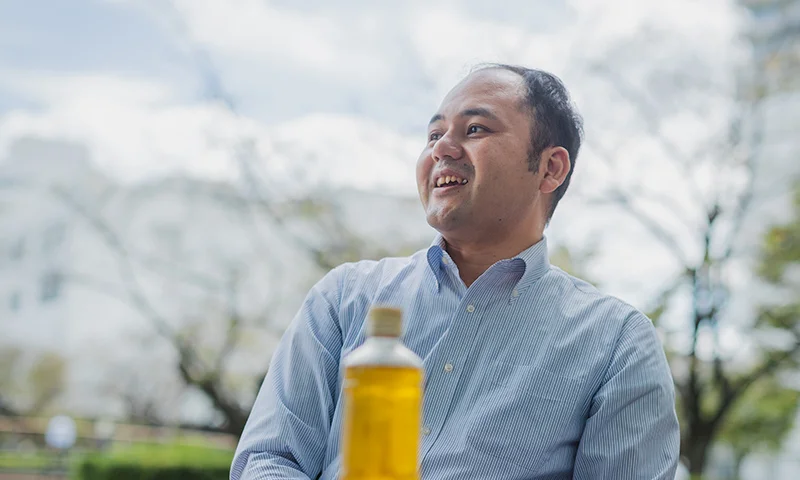
─── I’m impressed by your strong drive and ambition. Unlike you, many people struggle to figure out what they really want to do. How do you think a person can better develop their own personal dreams?
Hamada:I recommend talking with other people around you. It’s amazing how many DENSO associates are able to amplify your interests and give you new ideas if you take the time to talk with them!
─── Yes, of course.
Hamada:A lot of people at DENSO are actually big nerds in some way [laughs], so if you start talking to them about your interests, you’re likely to come across an expert or leader in that field somewhere within the organization. I think DENSO is a relatively easy place to find people who share your own ambitions and ideas.
─── I’ve always felt that it takes a lot of courage to walk up to someone and tell them about your passions and personal dreams. If that person is more passionate about the same interest, or more experienced in that field, I hesitate to speak up given my limited knowledge. In other words, I always feel like I have to remain humble and refrain from overstepping.
Hamada:I know exactly how you feel. However, if you’re talking to someone who’s truly interested in the same subject, you’ll find yourselves naturally finishing each other’s sentences and interjecting with fascinating facts as the conversation picks up. Therefore, I think it’s worth taking the courage to talk about your passions, as the end result will be rewarding.
─── In other words, rather than being nervous, it’s better to open up, because that’s the kind of atmosphere at DENSO?
Hamada:Yes. That’s been my experience, at least. If two people work together but aren’t aware of each other’s interests, then it’s hard to get conversations started. I recommend saying what you think and expressing your interests openly.
─── Is that based on your personal experience?
Hamada:Yes. Whenever somebody asks me what kind of research I do and I tell them, they usually introduce me to other associates who are interested in the same topics. New relationships start with casual conversations that develop into something deeper.
─── That’s a nice way to put it.
Hamada:Back in the day, a supervisor of mine once told me something particularly inspiring.
─── What was that?

Hamada:“There are many people out there who are good at solving problems. So keep coming up with new problems to solve.”
─── That’s encouraging!
Hamada:I think it embodies the goal of every researcher. We’re tasked with building new futures, so we’re always looking forward and coming up with exciting new visions, which are actually problems waiting to be solved.
DENSO’s corporate culture encourages members to ask about anything they are unsure or confused about, because other associates will always lend their support and thus help to achieve those visions for the future. At DENSO, people just can’t help themselves, they feel driven to help out! [laughs]
─── That’s a great corporate culture to have.
Hamada:People coming together around others’ questions, interests and passions give rise to new future possibilities. I believe that the more “problems” you think up, the more friends and partners you’ll find. Because I’m a researcher, I freely discuss any questions I have with others, and I’m also happy listening to any feedback and ideas. I hope these exchanges of ideas will give rise to positive synergistic effects.
At DENSO, nobody is left to tackle challenges entirely on their own. All sorts of people come together to brainstorm, connect, and achieve new possibilities as they move toward shared goals. That’s how we create new dreams and ambitions.
REACTION
Changing your "Can'ts" into "Cans"
Where Knowledge and People Gather.




Leave a comment